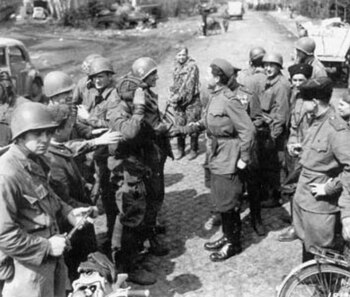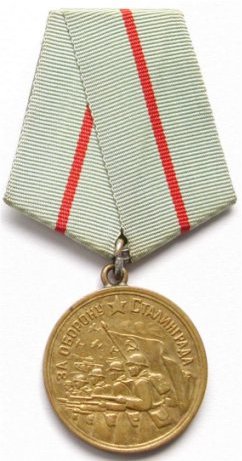 |
| Captured German soldiers being lead to prisoner camps in Stalingrad, 1943. In the background is the grain silo. (Photo credit: Wikipedia) |
 |
| From left to right: Joseph Stalin, Franklin D. Roosevelt, and Winston Churchill on the portico of the Russian Embassy during the Tehran Conference. (Photo credit: Wikipedia) |
 |
| American and Soviet troops meet east of the Elbe River (Photo credit: Wikipedia) |
 |
| USSR Medal defense of Stalingrad Crop of Wikimedia Commons picture: (Photo credit: Wikipedia) |
I have never been one to watch military parades, or to
think with anything but hostility and dismay of the whole militaristic view of
life. But there was something both poignant and shaming about the massive
parade held today in the Russian capital, Moscow, in commemoration of the
immense and costly Soviet effort in destroying the Nazi war machine.
Even I have known for many years
that the Soviet victory over the invading Germans was achieved with at least 20
million deaths, a figure that has recently been upgraded to as much as 27
million, of which less than half were military, and the rest civilian deaths,
suffered in such horrendous circumstances as the two-year siege of Leningrad
and the immense battle in defence of Stalingrad. Though it is true that
great quantities of materiél helped the
Soviet defence of their homeland, nevertheless, in human terms, there is no
comparison between the price paid by the
Russians and that paid by their Western allies, notably the Americans
and British. (I have often thought how different modern global history might
have been had the Americans lost 25 million of their people in the sort of
scorched earth war that the Russians had to endure).
The latest generally-agreed figures
suggest that whereas more than 34 million Soviet citizens were mobilized in the
effort to throw back the German divisions, only 175,000 men were mobilized, of half of
them American, in the D-day invasion of Europe in June 1944, which is usually celebrated
in the West as the decisive event in ending the war. The total loss of life of
Americans in the war is estimated to have been 420,000 --- not an
inconsiderable number, it is true, but far short of the casualties suffered by
the Russians.
The British are estimated to have
lost a similar number, and the Germans
between an estimated seven and nine million people.
The immense fuss that has been
made over this 70 year celebration of the Allied victory is motivated by the
fact that this is the last such celebration at which survivors of the great
World War II battles will be able to be present, and there was certainly something
impressive in seeing the faces of these grizzled, ailing, but proud old
Russians, whose memories of the war must have been of unforgettable experiences
that they must hope should never be repeated anywhere.
That was the poignant element;
but what was shaming to me was that the leaders of the Western powers refused
the invitation to take part in this commemoration, because President Obama of the United States had, in
effect, organized a boycott of the event by putting heavy pressure on other
Western leaders to absent themselves.
This is so mean-spirited that
even I, unsympathetic as I am to the commemoration of battles won or lost, felt
quite ashamed that our leaders could have bowed to such pressures by absenting
themselves. In his speech, President Putin gave generous acknowledgement to the
share of other nations --- even to many Germans themselves --- in defeating the
Nazi doctrine and its armies ,and he made only an oblique reference to the
change in his country’s relationship with the former Allies, by remarking on
the “exceptionalism” which had motivated the Nazi power, and which he hoped would
never again motivate any nation in foreign relations.
The fact is, in the West,
American propaganda, by way of films especially, has been working on our
populations to suggest that it was the Americans, almost alone, who won the
war, something that most Americans seem to believe. It was certainly true that
without American economic might the war would have been more difficult to win,
but there can be little debate with the proposition that it was the Soviet army
that broke the back of the Nazi war machine.
A recent article on the Information
Clearing House site by Ezequeil Adamovsky, an Argentinian historian, who
recalled how he had been influenced as a child by films depicting American
heroism, gave some startling facts as to how American propaganda has shaped
Western concepts of the Second World War. He writes about “the shift in
historical memory “ in France, a country that was directly liberated largely by
American military intervention:
In 1945, immediately after the end
of the war, a poll was conducted among French people. One of the main questions
was “Which country do you think played the most important role in the defeat of
Germany?” 57% of the interviewees responded that it was the Soviet Union,
20% chose the US and 12% the UK. The same poll was conducted again in 1994.
Interestingly enough, only 26% chose the Soviet Union this time, while 49%
responded it was the US. The poll was repeated in 2004. By then the reversal
was even more noticeable, with only 20% choosing the Soviet Union and 58% the
US (the perception of the British role did not change much).
He adds something I find it impossible to disagree with:
Obama and several European heads of
State have organized a boycott against Russia’s official parade of Victory Day,
which will be held this May 9 in Moscow. The boycott, they say, comes because
of Russia’s annexation of Crimea. This would perhaps be a valid reason, if it
was not for the fact that no boycotts are in order when the US bombs other
countries or forces changes of their governments, or when US allies –like
Israel– occupy other nation’s lands by military force.
So let us profit from this
opportunity to remember history beyond propaganda. If there was such a thing as
a “Free world” in 1945, it was to a great extent thanks to the armies of a
communist country and to the irregular forces of anti-fascist partisans in
France, Italy and other nations, a good deal of which were also communists. Our
grateful memory of those who died fighting fascism should include all of them.
No comments:
Post a Comment